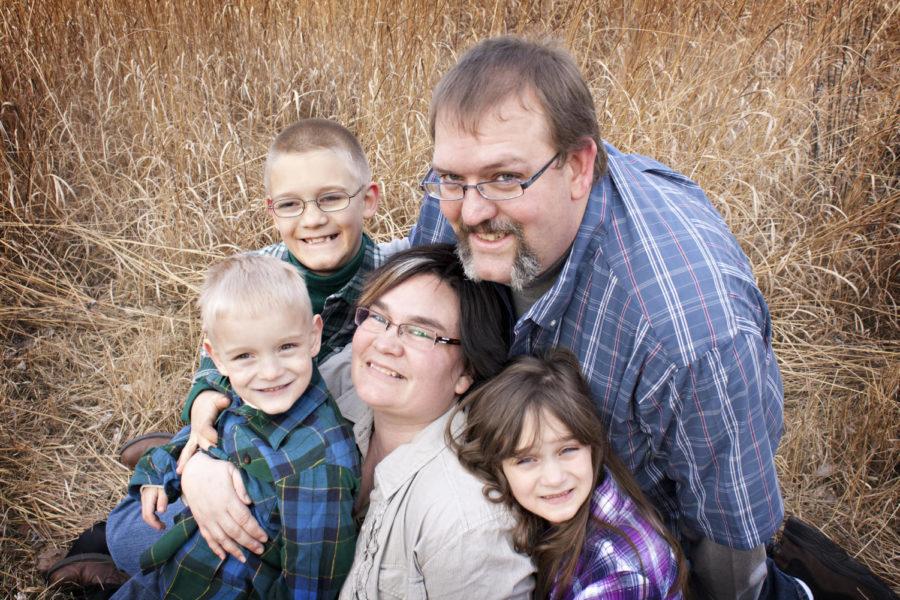Deaf with a capital ‘D’
Photo courtesy of Rachel Johnson
Rachel Johnson, a 37-year-old senior in history, with her family. Johnson, who is Deaf, believes herself to be culturally Deaf, as opposed to deaf with a lower-case “d.” Members of the deaf community find this distinction to be highly important.
October 12, 2012
In today’s world, being politically correct is often hard to do without offending someone.
However, for the Deaf with a capital “D” community, phrases and even capitalization or noncapitalization of the word “deaf” can make a huge difference.
Jonathan Webb, American Sign Language instructor and interpreter, explained that if someone is “Deaf,” that means they are culturally Deaf.
“Deaf individuals don’t consider themselves as disabled; they see themselves as a cultural and linguistic minority,” Webb said. “They don’t see themselves as a disability group because they have a shared set of values, shared behavioral norms, shared belief system and a shared language.”
Webb explained that asking a deaf person which type of deaf they are is not considered offensive because the ASL language is very direct.
“Asking someone directly, ‘Do you consider yourself lowercase ‘d’ deaf or capital ‘D’ Deaf,’ if they don’t know the difference, if they go, ‘What do you mean?’ then more than likely they are lowercase ‘d’ deaf,” Webb said.
Rachel Johnson, a 37-year-old senior in history, has considered herself culturally Deaf all her life.
“My native language is American Sign Language. I’m a visual person; I rely on picking up language in a visual manner,” Johnson said through sign language to Webb.
When Johnson’s parents found out she was deaf at 18 months, for an unknown medical reason, Johnson began a sign language program immediately. Johnson said her family began to learn ASL at the same time so they could learn together as a unit.
“I was introduced to Deaf adults as a young adult so that I would have those Deaf role models in my life,” Johnson said. “I happen to not be able to hear, but it doesn’t bother me at all that I don’t hear.”
John Purtle, sophomore in business management, became deaf as a result of a genetic mutation and received a cochlear implant in his right ear when he was 2 years old. Although he only has one implant, he estimates his hearing ability to be about 93 percent in his right ear.
“It’s not perfect, but it’s a hell of a lot better than nothing,” Purtle said.
Purtle considers himself to be lowercase ‘d’ deaf, as opposed to culturally Deaf. Purtle knows sign language but admits he’s pretty rusty.
“We deaf people have to jump through a lot of hurdles to actually get employment,” Purtle said. “We can’t just graduate with a high school diploma and expect to be anywhere above minimum wage.”
Purtle said that getting part-time work has been a struggle when most employers don’t give him a chance because of his deafness.
“I’m deaf, they don’t know what kind of accommodations I need and most of the time they don’t even try or wait and see,” Purtle said. “They’ll just see my resume and maybe call me in for an interview, but when they see that I’m deaf, their interest fades because no matter how much I come off as the ideal candidate, it’s all about economics.”
Webb warned that most of the time the use of phrases like “hearing impaired” or “hard of hearing” are improperly used.
“Hearing people develop or coin this term ‘hearing impaired,’ and that is not something that deaf people ever, ever use,” Webb said. “In fact, it’s considered offensive to them.”
Webb explained that deaf individuals that use the phrase “hearing impaired” are typically only audiologically deaf and often have cochlear implants.
Not realizing that most deaf individuals are actually very smart is a common misconception that deaf people encounter every day, Johnson said.
“I think often times hearing individuals see us as being mentally incompetent or intellectually incompetent,” Johnson said. “In reality, the only barrier that we have is a linguistic barrier.”
Webb’s biggest point of advice for those who want to communicate with deaf individuals: Be patient and take your time.
“In American culture, we rush, rush, rush to go from one task to the next, and that’s not the way that it works in the Deaf world,” Webb said. “It’s important to realize that in the Deaf community, it is important to show honor for someone by taking the time to actually engage with them.”
Webb also suggests writing back and forth with English as another way to communicate if someone doesn’t know ASL, but counting on lip reading isn’t going to work.
“Only about 20 percent of our [spoken English] language is actually visible on the lips,” Webb said.
Johnson wishes that everyone understood what it is like to be a singled-out minority.
“I think that learning ASL is fun, and it’s important because you’re not only learning the language, but you’re learning about the Deaf culture,” Johnson said.
Purtle wants hearing individuals to look past the fact that someone is different so that they can get to know them.
“I think they look at us as being disabled and they feel bad for us, and there is pity for us,” Johnson said. “They see us as limited and that’s not the case.”

















